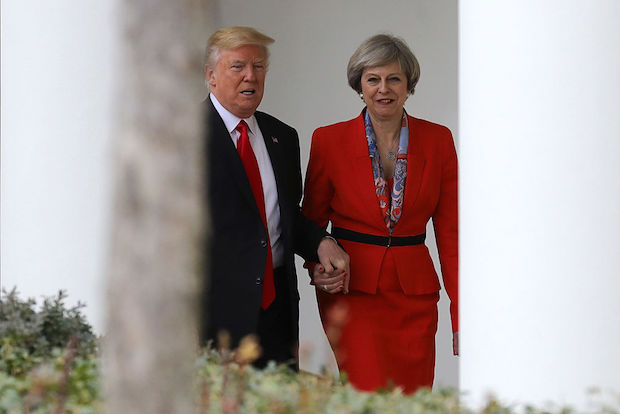Theresa May’s visit to Washington to meet President Trump last week was seen, before it happened, as being beneficial to both sides. The Prime Minister’s allies in government thought this was an excellent opportunity for May to show the new President how it was done – and to send a message to the world that Britain really matters.
But today things look a little less advantageous for the Prime Minister. That her visit was swiftly followed by Trump signing an executive order which halts all refugee admissions and temporarily bans people from seven countries has put the Prime Minister under pressure to criticise the man whose hand she ended up holding. Initially she didn’t – and was heckled by the press when dodging their questions on the matter. Overnight, Downing Street issued a clarification saying she ‘does not agree’ with the ban and will raise the matter with the US if it does turn out to affect British citizens.
But the visit has created further problems, which is that Trump now has a State visit to Britain which will involve him addressing Parliament. Given there is already one MP, Nadhim Zahawi, who says he will be affected by this ban, and given MPs poured so much effort into a debate which was at the time totally pointless about whether to ban the then-Presidential candidate from coming to this country, it is safe to say that a Trump address in Westminster Hall will not go smoothly at all. In fact, it is likely to become a badge of honour for MPs to say that they will refuse to attend.
Jeremy Corbyn is one of the politicians to say that May should be taking a much stronger line on this – and that the state visit should not take place until the refugee ban is lifted. Corbyn has his own troubles, but this is a handy row for the Labour leader to intervene in. Firstly, Trump’s refugee ban is despicable and politicians should be showing opposition to it, something that Corbyn will naturally find easier while already in Opposition. Secondly, it helps Corbyn’s general narrative that allying Britain with the United States fundamentally compromises this country. Thirdly, it is domestically useful for the Labour leader when his own supporters are having their first serious wobble over his stance on Article 50.
But Corbyn’s role in this is only peripheral: Theresa May now needs to decide whether a special relationship is like the sort of friendship in which people care about each other enough to tell the other when they are doing wrong. If she does think that, then her muted response to the ban so far does raise the question of how bad a policy needs to be before she thinks it is worth criticising Donald Trump.
From now on, every interaction between Britain and the US will be viewed through this prism of May failing to stand up to Trump. She didn’t need to have a Love, Actually moment of showing off, but she did need to say something that showed she vehemently disagreed. This stumble makes her strategy of taming the new President by staying close to him much harder to carry out.







Comments